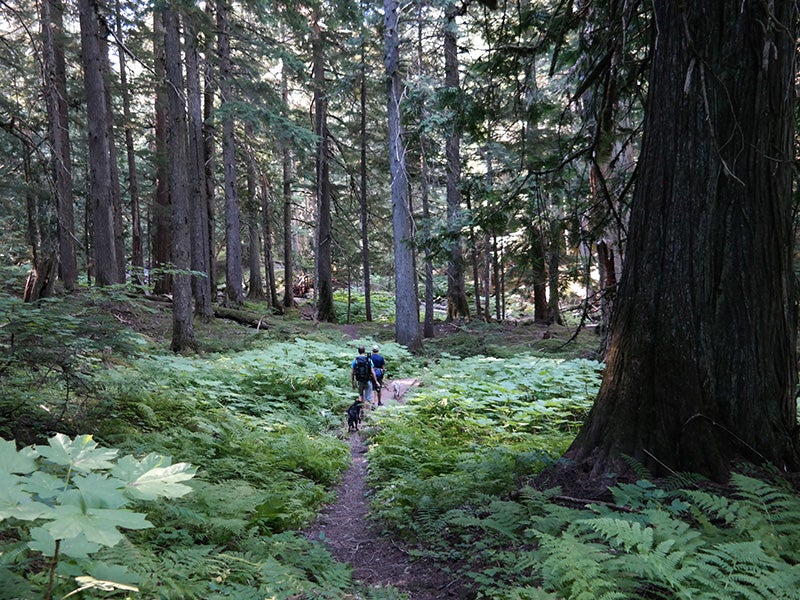Court Overturns Approvals for Montanore Mine in Northwest Montana
Victory
—Proposed mine would dewater wilderness streams and harm bull trout and grizzly bears
Contact
A federal judge has overturned government agency approvals for the proposed Montanore Mine, which would degrade wilderness trout streams and industrialize some of the last remaining grizzly bear habitat in the Cabinet Mountains of northwest Montana.
The proposed Montanore Mine is located in northwestern Montana.
In two decisions issued late yesterday, U.S. District Judge Donald Molloy ruled that the U.S. Fish and Wildlife Service and U.S. Forest Service violated the Endangered Species Act, the Clean Water Act, the National Forest Management Act, and the National Environmental Policy Act in approving a massive industrial mining operation on the boundary of—and literally under—the Cabinet Mountains Wilderness.
The ruling came in response to two lawsuits filed by conservationists who oppose the mining proposal on the grounds that it would impermissibly dewater some of the nation’s purest streams and jeopardize the survival of bull trout and grizzly bears.
“Yesterday’s ruling underscores how wrong it is to site major industrial facilities on the doorstep of public wilderness lands that provide irreplaceable habitat for imperiled wildlife,” said Earthjustice lawyer Katherine O’Brien, who represented Save Our Cabinets, Earthworks, and Defenders of Wildlife in challenging the government’s Endangered Species Act approvals for the mine.
“The federal court’s decision stands for one fundamental point: Clean water, wildlife, and the free-flowing streams of the West cannot be sacrificed for short-term mining industry profits,” added Roger Flynn, an attorney with the Western Mining Action Project, who represented Save Our Cabinets, Earthworks, and Clark Fork Coalition in challenging the Forest Service’s mining approvals.
The Montanore Mine, proposed by Hecla Inc. (NYSE: HL), would transform a remote landscape in the Cabinet Mountains into a large-scale industrial operation involving the mining and processing of as much as 20,000 tons of ore every day for as long as 20 years.
Katherine O’Brien / Earthjustice
East Bull Fork River. July, 2016. If constructed, the Montanore Mine would have drained water from this river, the area’s most important bull trout spawning stream. More photos
The site of the proposed mine lies within and adjacent to the federally protected Cabinet Mountains Wilderness that contains pristine forests, glaciated peaks, and rivers and streams that are among the purest waters in the continental United States. The proposed mine site and surrounding public lands offer some of the last remaining undeveloped habitat for critical populations of bull trout and grizzly bears that are hanging on by a thread because of habitat destruction, pollution, and poaching across their range. As the court recognized in yesterday’s rulings, “[t]he project is anticipated to have serious negative impacts on local populations of bull trout and an already declining grizzly bear population.”
Nevertheless, in decisions issued in 2014 and 2016, the U.S. Fish and Wildlife Service and U.S. Forest Service approved development of the mine—despite acknowledging a host of mining impacts including dewatering of streams in the Cabinet Mountains wilderness, dumping of waste water that is too warm for bull trout to tolerate, and increasing the likelihood that grizzly bears will be killed due to poaching and conflicts with humans. Yesterday’s court rulings invalidate those approvals, concluding, among other things, that the Forest Service’s action “puts the proverbial cart before the horse” in approving mine development despite prohibited impacts to wilderness waters.
“This is an important decision for the Cabinet Mountains Wilderness, which was first recognized as a special place by Teddy Roosevelt,” said Mary Costello of Save Our Cabinets. “Today, the Wilderness still provides habitat for increasingly rare wildlife and contains some of the purest water in the lower 48 states.”
“This decision sends an important signal to permitting agencies and to Hecla Mining Co. that you need to get it right when it comes to water,” said Karen Knudsen, executive director of the Clark Fork Coalition. “Permanently drying up pristine wilderness streams is not getting it right, and we’re glad that the court agreed.”
“This is great news for the struggling populations of bull trout and grizzly bears that find refuge in the Cabinet Mountains,” said Bonnie Gestring, northwest program director for Earthworks. “Our iconic wildlife deserve a fair chance at recovery.”
“Grizzly bears and bull trout are vital parts of our wildlife heritage,” said Jonathan Proctor, Rockies and Plains program director for Defenders of Wildlife. “This decision gives them the chance to remain.”

Additional Resources
About Earthjustice
Earthjustice is the premier nonprofit environmental law organization. We wield the power of law and the strength of partnership to protect people's health, to preserve magnificent places and wildlife, to advance clean energy, and to combat climate change. We are here because the earth needs a good lawyer.